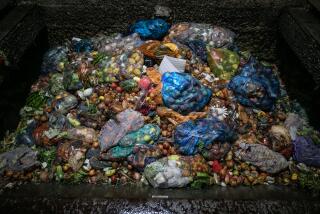Environment : Is Your Car a Wreck? It Could Be Time to Reincarnate It : Mandatory recycling of vehicles may be just around the bend in Germany, where biochemists are developing bacteria that eat autos.
- Share via
BONN — Good to the last drop is a slogan that may soon apply to Mercedes and Porsches under proposed laws that would require Germans to recycle their cars.
With already overburdened dumps growing more and more toxic by the year, Germany’s Environmental Ministry is pushing for regulations to hold car makers responsible for their product from showroom to scrapheap.
If approved by the various ministries and the Cabinet, the recycling law could go into effect by next spring, forcing manufacturers to take back their cars free of charge when the vehicles are ready for that proverbial autobahn in the sky.
The reforms are considered just the first step toward sweeping legislation that could eventually affect a wide range of goods, from batteries to electronic products.
“If they know they’ll have to be responsible for what they produce until the end of its so-called life cycle, then they’ll already be thinking about recycling when products are in the development stage,” said Karl-Heinz Koelschbach, a spokesman at the Environmental Ministry.
Oddly enough, it is the environmental movement--not the car industry--expressing ambivalence about the idea.
“It could lure people into thinking that cars are environmentally friendly, as long as you can recycle their parts,” said Wolfgang Herl of the Alliance 90-Greens Party. “How to deal with the pollution caused by auto plants and the forest-killing emissions from driving cars could end up forgotten on the back burner.
“We need to be thinking about a future without private cars altogether,” he said.
Although hearings on the car-recycling proposal are not expected to begin until late fall, no cry of alarm has been sounded yet from the country’s powerful automobile industry, which has had some voluntary recycling programs in effect for years.
“We’re going to have a meeting on the proposal later in the month and come up with a unified response,” said Petra Mai of the Automobile Industry Assn.
“What they’re talking about is technically possible,” she said, “but the proposal doesn’t answer important questions like what condition the car must be in to be reclaimed, and how this should be administered.”
The cost of recycling a car would vary, but it is expected to run at least $500 per vehicle. Currently, the government requires Germans to have their cars examined every two years to confirm they are still road-worthy. Cars that fail must be taken off the road--either by sale to used-car dealers or by paying a junkyard about $75 to $100 to take them. Cars in Germany have an average life span of 10 to 12 years.
Cars would be exempted from the new laws if the cost of disposing of them exceeded the value of recycled materials, or if damage from a wreck made it too expensive or difficult to salvage.
Several manufacturers, including Volkswagen and Mercedes-Benz, already have initiated voluntary recycling programs and pilot projects to determine the most effective way to squeeze every last ounce of reusable material from a car that once would have simply landed on a junk pile.
Mercedes, which counts 10,000 separate components in a mid-class car, already uses recycled newspapers to make glove compartments and refines old brake fluid into cleansers.
About 75% to 80% of the metal parts in the average junked car already are recyclable, experts say.
The real concern, though, is what’s left over after the vehicle has been shredded.
“Synthetic materials, like plastic, pose the biggest problem,” Koelschbach said. Many of these materials cannot be burned or chemically destroyed because of toxins they would release, but left alone in a dump, this waste also can contaminate soil.
The amount of synthetics--valued by the industry for durability and low cost--has been steadily rising in new car production, from 2.9% in 1979 to 13% last year.
Since 1984, the industry has been required to identify each synthetic material used to make their disposal safer.
The push to reduce “car waste” even has biochemists in Berlin developing an auto-eating bacteria.
The microbes devour cellulose and phenol-formaldehyde resins left behind by junked Trabants, the two-cylinder legacy of Communist East Germany.
“These microbes live on the surface of the car normally,” said marketing manager Stefan Krause of the Industry Research Center for Biotechnology. “We try to speed them up.”
But the only cars the process would work on are Trabants, and since they are no longer manufactured, the scientists cannot find the funding to continue their work, Krause said.
Anatomy of a wrecked auto
In Germany, 2.6 million private cars are junked annually. Only 10% are recycled. One wrecked car provides:
Body: * 1,562 pounds iron and steel
Tires, Bumpers: * 198 pounds rubber
Dashboard Interior: * 132 pounds synthetic material
Windshield, Windows: * 66 pounds glass
Under hood: * 48.4 pounds aluminum
* 22 pounds lead
* 13.2 pounds copper and brass
Source: German Environmental Ministry






